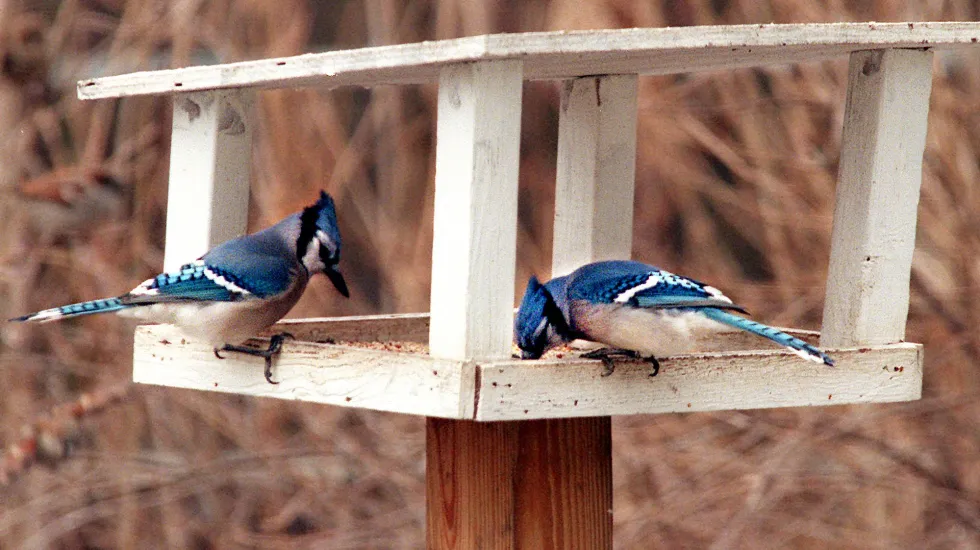
The cardinals are out in force this year. Every day a pair or two peck at my backyard feeder, joined by all sorts of warblers and finches, swallows and blue jays. I love watching birds. They add joy to life.
So when the Illinois Department of Natural Resources suggested residents take down their bird feeders and clean them with bleach to combat an outbreak of highly-contagious avian flu, I thought: “Wait a second! What about MY rights? You mean some government agency is going to tell me what I can do in my own backyard? Based on what? Where is the science? How are we to know that this isn’t the work of Big Bleach, the Clorox people trying to get us to start emptying bottles into buckets, willy-nilly?”
Columnists
In-depth political coverage, sports analysis, entertainment reviews and cultural commentary.
I decided to do my own research. There are questions whether birds even exist at all. ”Are Birds Actually Government-Issued Drones?” asks a 2018 headline on the Audubon Society web site no less. Look at the story yourself; I’m not making this up. There is a “Birds Aren’t Real” movement. If we can’t be 100 percent certain that birds themselves exist, how can anyone discuss the supposed ailments that these supposed “birds” supposedly have?
Kidding. I took my feeder down immediately, cleaned it with bleachy water, as instructed, then used the mixture to wipe down the cast iron hook and squirrel defense system.
Why? Because a person who appreciates birds enough to feed them should not unwittingly cause their deaths. And as smart a guy as I fancy myself to be, I’m not the sole arbitrator of everything. State natural resource experts know more about birds than I do.
The whole “trust-knowledge” mindset that runs against the chunk of the population who reacted to COVID-19 by covering their ears and making gargling noises or declaring what they want has to be right, since they want it. Wah.
The attitude infused a column on vaccinations that ran in the Chicago Reader last November.
“As a father of a young child, I am pressured to get my daughter vaccinated for COVID-19,” Leonard Goodman began, before denouncing, “the feverish hype by government officials, mainstream media outlets, and Big Pharma, and the systematic demonization and censorship of public figures who raise questions about the campaign ...”
Goodman airs notions like “there are reputable scientists opposed to mass vaccination”—sure, there are reputable scientists who believe in faeries, but we don’t accept their explanation of where frost comes from.
The typical how-can-we-know-anything? twaddle that I made fun of regarding birds is not the sort of opinion normally found outside of a cartoon in the Reader, where sincerely-delivered paranoid conspiracy theories are off brand.
But Goodman is a co-owner of the Reader and used his “It’s my ball so I get to be quarterback” card to jam it in. Such ownership follies usually cause a blush of shame and then are forgotten.
But the wrongness, not so much of the column itself when published, but later, when objections by actual journalists at the Reader were steamrolled, led to pushback by staffers and members of the public. Causing Goodman, a scion of the Crown family used to having his way, apparently, to clutch at himself, and the whole roiling tempest has gone on for months and is threatening to destroy the publication’s hopes for life as a non-profit, as Goodman digs in, backed up by pals on the board.
“If they think it’s journalistic par-for-the-course to rewrite and edit an article because it’s unpopular, they should go back and review the First Amendment,” the Washington Post quotes Reader board member Sladjana Vucovic as saying.
I can only hope inaccurately, since anybody even vaguely familiar with law knows the First Amendment relates only to government suppression of speech and is not carte blanche requiring any publication to share any idiocy that anyone cares to impose upon it.
As an actual newspaper columnist, as opposed to a wealthy lawyer pretending to be one, I have to point out how the system works: I trust my editors, and when he or she brings up a concern, I give it my full attention, because they are looking out for both the reader and myself.
They might ask me to sand off a few jagged edges — which indeed they did — that might cause more trouble than they’re worth. The purpose of a column is to get people thinking and talking, not serve as an albatross moldering around a publication’s neck.
I’d like to remind Goodman, in a friendly fashion: Rich folks who try to use Chicago journalism as a salve for their swollen egos often get pricked for their efforts.
Michael Ferro went from the wunderkind who persuaded Illinois Tool Works to shell out $292 million for some nugatory web site, to a panting Jenny McCarthy fanboy who bought the Los Angeles Times so he could get tickets to the Academy Awards.
Sam Zell swapped his reputation as a fearsome and savvy corporate grave dancer for that of a foul-mouthed bully browbeating female reporters during his inspection tour through the Tribune he was about to destroy.
As to what Goodman’s reputation will be, that depends if he really allows the Reader to run aground in a fit of ego over having his airy nonsense questioned. Some stains don’t wash off.







